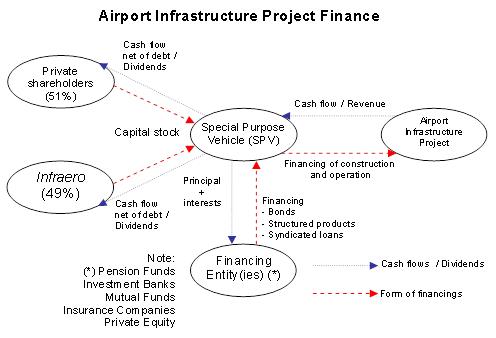Privatization of Brazilian Airports
Daniel Takaki*
Lucas R. Kurtz*
On July 22, 2011, through Brazilian Decree 7.531/11, Brazil's National Council of Privatization announced their approval to transfer the management of several airports. We now expect that the administration of Cumbica (Sao Paulo), Viracopos (Campinas) and Juscelino Kubitschek (Brasília) airports will be transferred to the private sector in 2012.
The Brazilian government's intention to privatize these airports demonstrates their effort to improve infrastructure prior to the 2014 World Cup and 2016 Olympics.
Based on preliminary discussions and similar concession implemented in other countries, we would suggest that the Brazilian government may rely on the structure below (several other options are also possible).

Although the bidding notice is not expected to be released until November or December 2011, the winning bid may be announced as early as December 22, 2011. Transfer of management is scheduled to occur during the first or second quarter of 2012. While governmental discussions and announcements are still unofficial, the ambitious timetable make it pertinent for private companies to begin preparations prior to release of the official bidding notice.
We anticipate that: (i) a Special Purpose Vehicle (SPV) will have to be incorporated; (ii) the awarded bidder will hold 51% of the ownership rights in the SPV; (iii) state owned management entity, Infraero, will hold 49% of the ownership rights in the SPV; (iv) a high amount of requested initial investment, will require the participation of lenders to finance the business operations of the SPV; (v) collateral will have to be provided in order to secure financing; and (vi) at least one company participating in a bid will be required to have airport management experience.
The future bidding notice will also determine the conditions governing services provided by private companies and will likely include: (i) minimum investment or capital requirement in the SPV; (ii) admitted practice fee range charged to the airport users (flight passengers, flight companies, parking fees, etc.); (iii) management structure for entity(ies) that will manage the airports; (iv) terms and conditions for a golden share1 (government veto power to block certain corporate actions); and (v) economic terms, conditions and financial projections.
Brazilian concessions are governed by Section 175 of their Constitution and Brazilian Concessions Law (Federal Law nº 9.074/95). Historically, concessions have been the primary mechanism in which airports in Latin America2 have come under private sector control. Brazilian airport concessions will likely be designed to determine how the country's largest public airports operate under private stewardship.
The term concession and privatization are often confused. Concessions refer to any arrangement under which a private entity obtains the right to provide a service historically provided by the government. Under Brazil's plan to transfer the management of the above mentioned airports, concession contracts will grant operational and management rights to a private entity for a term of years. Ownership will be retained by Brazil and at the end of the contract, the right to manage and operate the airports will be transferred back to the government.
Concessions often operate under a BOT - Build-Operate-Transfer scheme. Under this scheme, a private company is given the right to develop the infrastructure on the property and the infrastructure will revert back to the government when the concessions expire.3 However, it is often difficult for private entities raising capital to carry-out the planned improvements under a BOT arrangement (and with concessions in general), due to the fact that the fee simple ownership rights are retained by the government.4
However, concessions and BOT schemes often lead in to full-scale privatization through divestiture of the government’s interest after it has been determined that a public enterprise operates effectively under private control. Many developing countries wanting full privatization have concluded that the use of concessions are the most advantageous transitional mechanism to achieve their goal due to the fact that concessions provide a trial period in which the country can see how an institution like an airport will operate while under the control of a private entity and free market principles. Thus, if the concessions pertaining to the management and operational rights of the previous mentioned Brazilian airports are deemed successful, the positive experience could prompt the government to completely turnover these rights to the private sector in the future.
Unfortunately, until the bidding notice is released, the exact terms and conditions governing the bidding process, as well as the period of concession, remains unknown. We will closely monitor the release of the bidding notice, and upon its release, will examine the main legal and financial issues.
Currently, Brazil only has one operating airport that is managed by the private sector. The International Airport of Cabo Frio, located in the State of Rio de Janeiro, was privatized in 2001, and it was awarded for a period of 22 years. On August 22 2011, the airport of ASGA - Sao Gonçalo do Amarante (currently under construction), located in the State of Rio Grande do Norte, was also privatized. The awarded party now has 3 years to build the airport and 25 years to operate it.
__________